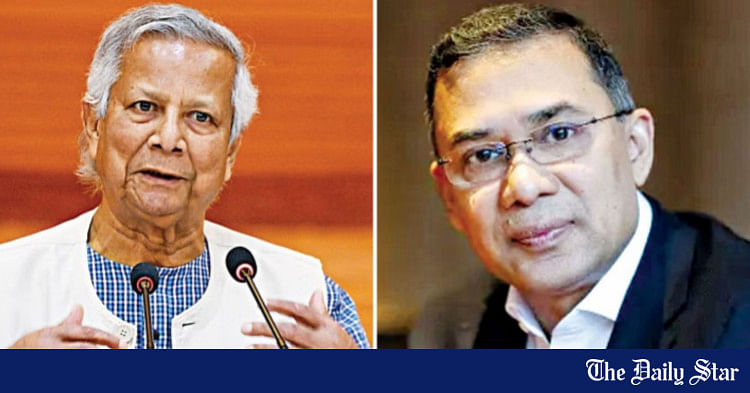Chief Adviser Muhammad Yunus, left, and BNP Acting Chairman Tarique Rahman, right. File photo
“>
Chief Adviser Muhammad Yunus, left, and BNP Acting Chairman Tarique Rahman, right. File photo
Chief Adviser Muhammad Yunus and BNP Acting Chairman Tarique Rahman are set to meet there on Friday evening
Over the decades, The Dorchester Hotel has played host to countless legendary celebrations, milestone moments, and important meetings.
Yet another one may be in the works as two of Bangladesh’s important figures—Chief Adviser Muhammad Yunus and BNP Acting Chairman Tarique Rahman—are set to meet there from 9:00am to 11:00am on Friday (local time), nearly 8,000 kilometres away from Dhaka.
In tea stalls and drawing rooms, in offices and on buses, one question echoes: Will they find common ground?
The nation watches with hope, anticipating that the two will match pace, stride for stride, and steer the country toward stability.
This potentially pivotal meeting is occurring at a time when an unelected interim government is leading the nation through political turbulence.
The roots of this moment trace back to a volatile political season in Bangladesh. Initially, the BNP aligned itself with the interim government’s objectives, but over time, fractures emerged. At the heart of the divide is the date of the next general election.
The BNP demands elections by December 2025, citing democratic urgency. Yunus, however, has consistently insisted that will be sometime between December this year and next June to allow time for reforms and for the trial of perpetrators involved in the killings that occurred during the July mass uprising.
Recently, however, the chief adviser said it would be sometime in the first half of April.
It is in this backdrop that he will meet the BNP leader.
The uncertainty surrounding the outcome of this meeting is compounded by Bangladesh’s long history of failed dialogues.
Previous attempts to foster negotiations between major parties have collapsed, as decades of distrust have made consensus nearly impossible.
In 1994, the Awami League questioned the neutrality of the then-BNP government following the rigged Magura by-election. Later, Commonwealth Secretary-General Ninian Stephen attempted to mediate, but it was rejected by the ruling BNP.
A group of civil society members tried again in 1996, followed by former US president Jimmy Carter in 2001.
Neither initiative succeeded.
In 2006, talks between the two effective seconds-in-command of the BNP and Awami League, regarding an election-time government, also proved fruitless.
In 2013, UN Assistant Secretary-General for Political Affairs Oscar Fernandez-Taranco visited Bangladesh to initiate discussions. However, this attempt also failed, leading to the BNP boycotting the election and the Awami League forming a government with 153 lawmakers elected uncontested.
Now, as Yunus and Tarique become the epicentre of yet another national moment, many remain hopeful that this time it will be different.
This meeting follows a mass uprising that has significantly altered Bangladesh’s political landscape—especially in the absence of the Awami League.
Tarique, living in exile for nearly two decades, has seen his party struggle to topple an authoritarian government. He now makes more measured statements about the importance of democracy, while the BNP propagates 31 key reforms to strengthen democratic institutions.
Similarly, Yunus emphasises that reform is essential to ensuring the functionality of democratic institutions and preventing the return of autocracy.
The country stands at a crossroads, and for many, this meeting represents a significant opportunity to forge a path toward stability. Across Bangladesh, people cling to the belief that this time it could be different—that Yunus and Tarique will rise above divisions and embrace a shared vision for democratic renewal.
From activists to ordinary citizens, there is optimism that this dialogue could lead to political stability. But a deadlock could push the country further into uncertainty.




